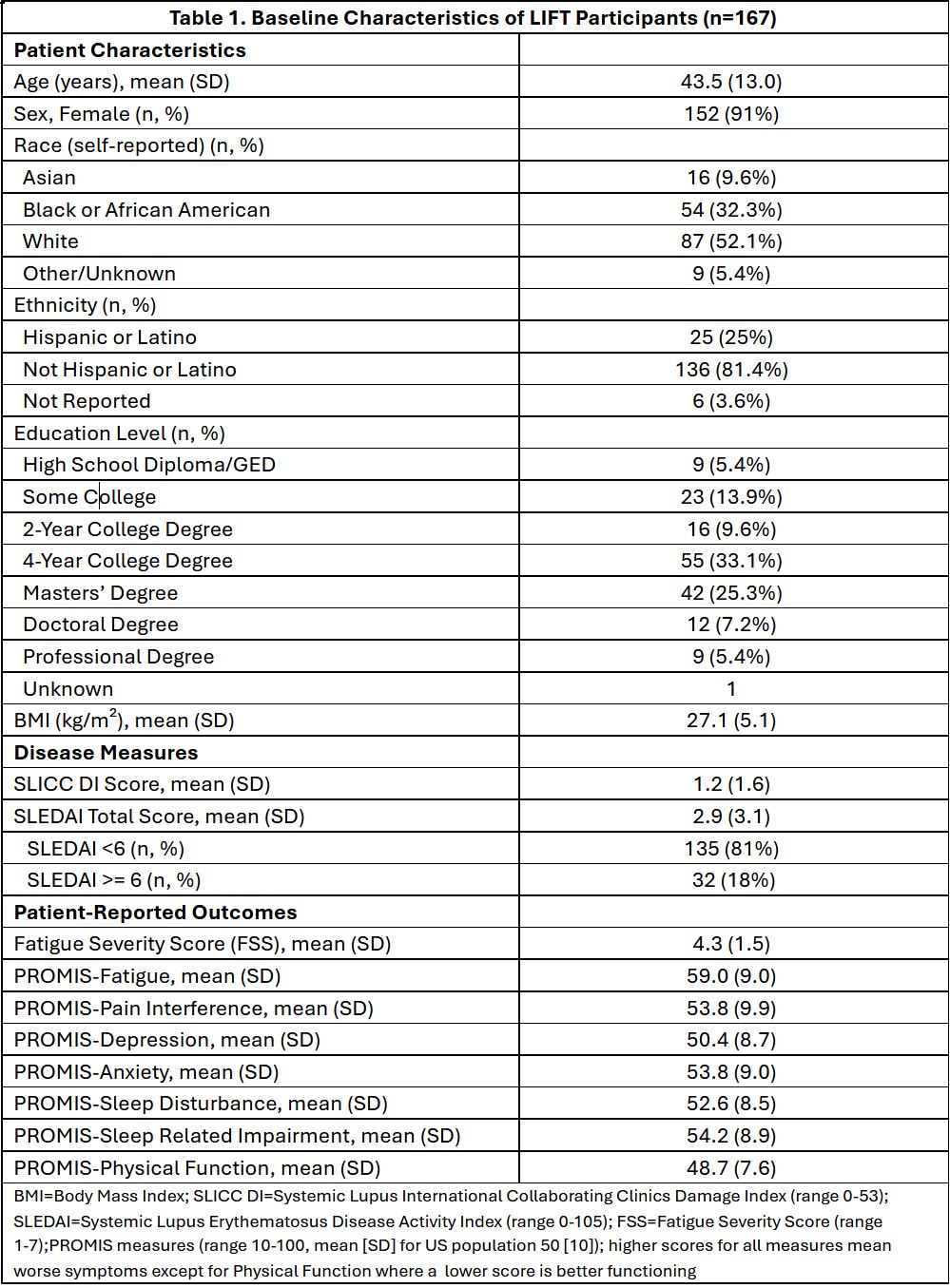Session Information
Date: Tuesday, October 28, 2025
Title: (2437–2469) Systemic Lupus Erythematosus – Treatment Poster III
Session Type: Poster Session C
Session Time: 10:30AM-12:30PM
Background/Purpose: Systemic Lupus Erythematosus (SLE) is associated with persistent fatigue. Physical activity (PA) & dietary intake are potential modifiable behaviors that can reduce fatigue in people with SLE. The Lupus Intervention Fatigue Trial, LIFT (NCT02653287), a 12-month, phase II randomized, parallel-group, single-blind study compared motivational interviewing counseling targeting PA & diet with an education-based control program to reduce SLE fatigue. We also assessed neighborhood conditions measured by the Area Deprivation Index (ADI), as a potential factor impacting PA & diet.Objectives: Present baseline descriptive results of LIFT participants. Assess associations between ADI and PA/diet intake.
Methods: LIFT criteria included age ≥18 yrs, English proficiency, walk household distances, BMI 18–40 kg/m², and meeting ACR or SLICC classification criteria for SLE. Accelerometers worn for 7 consecutive days during waking hours captured daily PA: sedentary < 100 counts/min, light PA (LPA) 101–2019 counts/min, and moderate-to-vigorous PA (MVPA) ≥2020 counts/min. Weekly MVPA=daily MVPA average x 7. Diet intake assessed via 24-hour recall from Nutrition Data System for Research (NDSR) generated Healthy Eating Index (HEI) total score (0-100) & food group scores 0-5 or 0-10) with higher scores being healthier. ADI derived from participants’ 9-digit ZIP codes (higher ADI values indicate more deprivation, for 17 socioeconomic indicators). Patient-Reported Outcomes (PROs) used Fatigue Severity Score (FSS) & PROMIS measures for Fatigue, Pain Interference, Depression, Anxiety, Sleep Disturbance and Related Impairment, & Physical Function. Descriptive statistics were calculated; Spearman correlations used to assess associations between PA, or HEI and ADI.
Results: Baseline demographics, disease characteristics, PRO’s, and HEI for 167 LIFT participants are shown in Table 1; Figure 1. Most participants had low disease activity, low damage scores, low total HEI score (poorer diet quality), and high FSS & PROMIS-Fatigue scores. Most participants lived in less deprived areas, ADI [mean 34.7 (21.4)]. Only 32.5% of participants met U.S. guidelines for PA (≥150 MVPA min/week); MVPA min/week was negatively correlated with ADI suggesting persons living in higher ADI deprivation areas had lower average MVPA minutes (Table 2). Recommended changes based on HEI score are in Figure 1. Modest statistical association was found between ADI (high) and total vegetable intake (low), rho=-0.15, p= 0.049.
Conclusion: Preliminary LIFT baseline data suggest despite low disease activity, LIFT participants have significant fatigue, 1/3rd meet PA guidelines ( >150 mins/week of MVPA); lower HEI total and food group scores suggest need for improved diet quality. Mean MVPA minutes/week and total vegetable intake were negatively correlated with ADI rank showing those in higher ADI areas were less physically active and had poorer diet quality. Follow-up analyses will assess change in fatigue between baseline & 6 month visit to compare the intervention and control groups. Tailored interventions to address individual & contextual barriers may be needed to improve PA & HEI impact on fatigue.NIH P30AR072579, R01AR071091, ULT1R001422, RRF
To cite this abstract in AMA style:
Arnold J, Ehrlich-Jones L, Kinnett-Hopkins D, Van Horn L, Whiteford G, muhammad L, Song J, Chmiel J, Chang R, Semanik P, Chung A, Erickson D, Bartels C, Ramsey-Goldman R. Lupus Intervention Fatigue Trial: Preliminary Analysis of Baseline Data [abstract]. Arthritis Rheumatol. 2025; 77 (suppl 9). https://acrabstracts.org/abstract/lupus-intervention-fatigue-trial-preliminary-analysis-of-baseline-data/. Accessed .« Back to ACR Convergence 2025
ACR Meeting Abstracts - https://acrabstracts.org/abstract/lupus-intervention-fatigue-trial-preliminary-analysis-of-baseline-data/


.jpg)
.jpg)